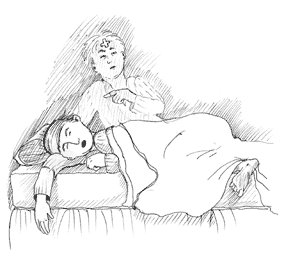True spit: Are you awake or not?

DRAWING BY DEBORAH DERR McCLINTOCK
Q. You're dreaming one night when suddenly you realize it's only a dream. Neat! A "lucid" dream. You try an experiment: Spitting on a dream finger, you draw a wet cross on your forehead. Moments later you awaken... to find your forehead bears an actual wet cross! How can this be? –E. A. Poe
A. This actually happened to pioneer dream researcher Frederik van Eeden, who was astonished to find that his saliva had somehow crossed over from his dream into reality, describes Leonard George in Alternative Realities. But then van Eeden really woke up, and "knew at once that the hand of my physical body had been lying in a closed position undisturbed on my chest all the while."
What van Eeden had experienced was a "false awakening," moving him from one level of awareness– he knew he was dreaming– to another level– still dreaming, but no longer aware of it. Rarely, dreamers will pass through several false awakenings before becoming truly awake, raising the old mystic's wonder if ordinary everyday consciousness is not still some sort of "dream within a dream."
Q. In the old TV game show "Let's Make a Deal," contestants selected one door out of three hoping to win the big prize. Before opening it, host Monty Hall would open a "wrong" door. Now players were given the opportunity to switch to the second unpicked door. Should they switch? –H. James
A. When "Ask Marilyn" columnist Marilyn vos Savant, IQ 228, recommended switching, irate letters poured in, says Sharon Bertsch McGrayne in 365 Surprising Scientific Facts, Breakthroughs, and Discoveries. How could switching doors change the basic chance of one in three? The controversy raged for weeks, reaching even the CIA.
As it turned out, Marilyn was right. Here's why: Though initially the chance was one in three of getting the prize, players had a two-in-three chance of missing. Not good odds. But what if they could pick two doors!? Well, said Marilyn, in effect they could– if they switched.
Logic: Assume the contestant selects A; now chances are two in three that the prize is behind B or C. Then Monty opens up one of the wrong doors– say B– paving the way for a switch to C, yielding a two-in-three chance of winning since B & C together were two-in-three, and B had been eliminated.
Sure, by switching, gamers might have lost the prize if they had initially picked it. But that would happen only one time out of three. The other two times, they were happy winners!
Q. Why is it so tough talking your way to romance with the attractive stranger you meet at a party?– J. Casey
A. Barely a few feet apart, nose to nose, and holding this for 3-5 minutes for a typical party chat, the two of you look repeatedly into each other's eyes– the listener looking, the speaker looking away, then back and forth in facial minuet, says anthropologist David Givens in Love Signals. Here, conversation can be a real ordeal.
"No other animal hooks up face to face in courtship quite the way we do... Eye to eye, our heartbeat rate increases. A glance away for only three seconds (to relax) can bring the rate down as much as 10-15 beats per minute."
Standing this way, you see all the facial signals up close– hair, skin's smoothness and wrinkles, pouches, pits, teeth, whites of the eyes. You smell the breath, feel body heat, hear the subtlest voice tones.
Two levels operate at the same time: The words spell out the meeting of minds, but beneath it's an emotionally loaded, hormonal experience.
"A couple can talk about nuclear physics or Malibu– it doesn't matter– and flirt at the same time. But it can all be agony. Speaking doesn't just put you on the line, it hangs you way over the edge," Givens says."
Send Strange questions to brothers Bill and Rich at .
#